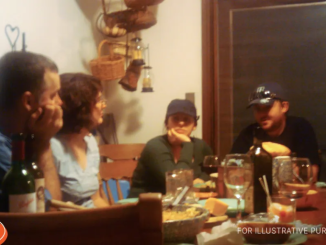
“I’m telling you, we need better locks for the cans,” I suggested one morning as Kyle angrily watched me scoop up the scattered garbage. “Maybe some chicken wire around the garden too. My sister Jane says that worked for them.”
“I don’t care what your sister says. What we need is to get rid of them. Permanently.”
I remembered when we first met, how his spontaneity had seemed charming. Now, at forty, that impulsiveness had morphed into an iron-fisted need to control everything, including me.
“Kyle, please. Can’t we try the peaceful way first?”
He jabbed a finger at me. “You always do this, Josie. Always trying to make everything complicated when there’s a simple solution right in front of us.”
“Simple doesn’t always mean right.”
He slammed the broom against the side of the house. “What was that?”
I flinched. “Nothing. I’ll look into better trash cans today.”
That weekend, I found Kyle in the garage, assembling something metallic.
“What’s that?” I asked, though I already knew. Animal traps.
He didn’t look up. “Insurance. These smart traps will catch anything that comes near our trash.”
“Kyle, please. They could hurt them.”
He slammed down his screwdriver. “That’s the point! I’m so sick of you defending these disease-carrying vermin. You act like they’re some kind of pets.”
“They’re not pets, but they don’t deserve to suffer. Maybe if we just—”
“Maybe if we just what, Josie? Let them take over? Build them a guest house while we’re at it? I’ve had it with your bleeding heart routine.”
I felt tears welling up but forced them back. “Why does everything have to be solved with violence? They’re just hungry animals, Kyle.”
He stood up, his face red. “You want to know what I think? I think you care more about these pests than our home. Than me.”
“That’s not fair.”
“Isn’t it? Every time I try to solve a problem, you fight me. The raccoons, the neighbor’s dog that keeps barking all night, even that group of teens that hangs out by our fence.”
“Those are all living beings, Kyle. Not problems to be ‘solved.’”
“This is my house!” he yelled, making me jump. “I work every day to pay for it, to keep it nice, and I’m not going to let some animals destroy it while my stupid wife takes their side!”
When the raccoons started showing up again this spring, Kyle completely lost it.
That evening, I was folding laundry when he stormed in, waving a piece of paper and grinning like he’d won the lottery.
“You’ll never guess what I found at the hardware store. Industrial-grade pest control. Guaranteed to solve our little problem.”
I took the paper. It was a receipt for animal traps and some kind of poison. My hands started trembling.
“Kyle, you can’t be serious. That stuff could kill them!”
He snatched the receipt back. “That’s the point, Josie. God, sometimes I think you’re being dense on purpose.”
“But what if neighborhood cats get into it? Or someone’s dog? We could get in trouble.”
Kyle’s face darkened. “I’ve made up my mind. The raccoons are gone by the end of the week, one way or another.”
I spent that night tossing and turning, my mind racing. When did the man I married become someone who could so casually talk about killing innocent creatures?
I thought about calling Jane, but I already knew what she’d say. She’d never liked Kyle and always said there was something off about him. Maybe I should have listened.
The breaking point came on a quiet Tuesday night two days later. I was reading in bed when I heard rustling outside. Peering through the window, I saw one of the trash cans had been knocked over again.
I slipped on my robe and grabbed a flashlight. As I approached the mess, something caught my eye. It was a black garbage bag, partially open, with something moving inside.
My hands trembled as I reached for it. “Oh no. No, no, no…”
Inside were three tiny raccoon babies, barely old enough to open their eyes. They were squirming weakly.
“Kyle!” I screamed, cradling the bag close. “Kyle, get out here right now!”
He appeared on the porch, looking annoyed. “What are you yelling about? It’s the middle of the night, you crazy woman!”
“Did you do this?” I held up the bag. “Did you throw away baby animals like they were garbage?”
He shrugged. “They’re pests. I’m handling it.”
“Handling it? They’ll die!”
“That’s the point, Josie. Jesus, why are you so naive? They’re just raccoons!”
“Just raccoons? They’re babies, Kyle! Living, breathing creatures that feel pain and fear. How would you feel if someone threw you away to die?”
He laughed, a cold sound that made me shiver. “Now you’re comparing me to a raccoon? How dare you, Josie?”
“I’m comparing you to someone with empathy, and you’re coming up short.”
Kyle stepped closer, his voice a chilling growl that made my blood run cold. “You know what your problem is? You’re soft. Always have been. The world isn’t some fairy tale where we all just get along. Sometimes you have to be tough.”
“Tough? There’s nothing tough about hurting something weaker than you. That’s just cruel.”
I looked at him and wondered how I’d never seen the cruelty that had always been there.
The next morning, I called every wildlife rescue in the area until I found one that could help. A kind woman named Marla showed me how to feed the raccoon kits with a tiny bottle.
“You’re doing great,” she assured me, watching as I cradled the smallest one. “They’re lucky you found them when you did.”
As I watched the kit suckle eagerly, tears rolled down my cheeks. “I just don’t understand how someone could be so cruel.”
Marla squeezed my shoulder. “Sometimes the animals we save end up saving us too.”
That evening, I found Kyle’s journal and a detailed plan for dealing with the “raccoon infestation.” It included poison locations, trap placements, and even a schedule. The methodical cruelty of it made me sick.
When Jane arrived, she saw the journal in my hands.
“Still think I’m overreacting?” I asked, showing her the pages.
She shook her head. “Josie, this isn’t about raccoons anymore. Maybe it never was.”
“I know,” I whispered. “I think I’ve always known.”
The divorce papers were served a week later. Kyle didn’t seem surprised, just angry. As always.
“You’re really throwing me out over some pests?” he spat as he packed his things into boxes.
I stood my ground in the doorway of what was now my house alone. “No, Kyle. I’m ending this because of who you’ve become. Who you’ve always been, maybe, and I just didn’t want to see it.”
Days turned into weeks. The raccoon kits grew stronger.
The smallest one was shy and always hid behind his siblings. The middle one was curious about everything. And the biggest was protective, always watching out for the others.
Marla helped me release them back into the wild when they were ready. As we watched them toddle toward the treeline, I saw movement in the bushes. There, watching us, was their mother.
“Look,” Marla whispered. “She came back for them.”
The mother raccoon chittered softly, and her babies ran to her. Before disappearing into the forest, she turned and looked right at me. In that instance, I felt a connection to something larger than myself. Compassion.
“You know,” Marla said, “there’s an opening at the rescue center if you’re interested. We could use someone with your kindness.”
I smiled, feeling lighter than I had in years. “I’d like that.”
“You know, Josie, you can tell a lot about a person by how they treat animals. They’re like a mirror that reflects our true selves.”
Looking back, I realized the raccoons hadn’t just been victims of Kyle’s cruelty. They’d been my wake-up call. Sometimes it takes seeing someone else’s vulnerability to recognize your own.
As the raccoons disappeared into the trees, I took a deep breath and felt ready for a fresh start. I knew I deserved better, and that someday, I’d find the right person who saw the world with the same compassion I did.
3 Surprising Stories About People Who Aroused Their Partners’ Suspicions — It Turns Out Not Unfoundedly

Those stories definitely illustrate how instinct and observation can sometimes reveal hidden truths in relationships. It’s fascinating—and often heartbreaking—how small signs can lead to major revelations. Each scenario highlights the importance of communication and trust, and how a lack of transparency can lead to suspicion and betrayal.
In the first story, the protagonist’s gut feeling ultimately led her to uncover a painful secret, showing that sometimes our instincts are our best guides. In the second, the act of proposing with a ring that had a past tied to an ex raised red flags that became impossible to ignore, leading to a significant breakdown in trust. And the last story reflects how misunderstandings can spiral out of control, illustrating the delicate balance between trust and suspicion.
It’s interesting to see how these dynamics play out and how they can either lead to resolution and healing or further complications in relationships. What do you think about these kinds of situations?



Leave a Reply